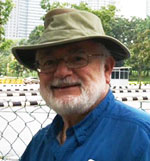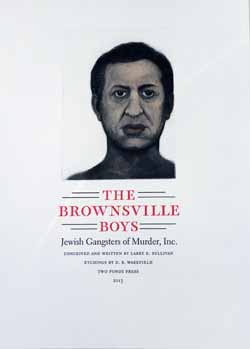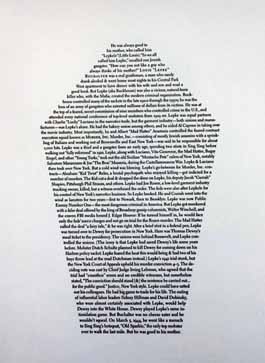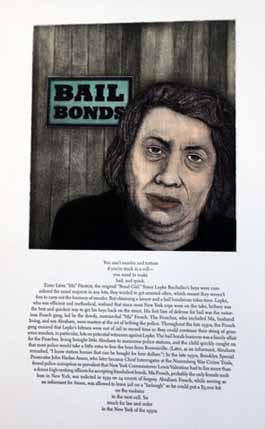By Oliver B. Pollak

 RICHMOND, California — CODEX, the Latin word associated with books and paper, meets every two years in Craneway Pavilion, which was the old 1931 Ford Plant in Richmond and the center of war production for the Kaiser Shipyards. It is next to the National Park Service Rosie the Riveter WWII Homefront Park which opened in 2000. We live a fifteen-minute walk from this complex.
RICHMOND, California — CODEX, the Latin word associated with books and paper, meets every two years in Craneway Pavilion, which was the old 1931 Ford Plant in Richmond and the center of war production for the Kaiser Shipyards. It is next to the National Park Service Rosie the Riveter WWII Homefront Park which opened in 2000. We live a fifteen-minute walk from this complex.
Over 200 innovative publishers, printers, illustrators, book designers, paper makers, bookbinders, and artists display their wares there recently for four days. It’s heaven for bibliophiles and typophiles. The excitement is palpable. Thousands of guests pay $10 for a one-day pass to look at art books that can run into six figures. Oohs and aahs abound as visitors look and touch the extra ordinary array of the finest contemporary book arts from the United States and 25 countries spread over five continents.
My wife and I spied many books with solid Jewish craftsmanship and content. But a $4,200 volume on the darker side of Jewish life leaped out at us. The Brownsville Boys, Jewish Gangsters of Murder, Inc. is named for a neighborhood in Brooklyn. The book is written by Larry E. Sullivan, a former librarian at Maryland State Penitentiary. He is the author of several books, including the Encyclopedia of Law Enforcement (2005). He teaches criminology at John Jay College of Criminal Justice attached to the City University of New York. The etchings are by D. R. “Bob” Wakefield, who was mentored by Leonard Baskin. Readers may be familiar with Baskin’s illustrations from his contribution to the New Union Haggadah published in 1982. The book was published by Two Ponds Press in Rockport, Maine. in 2013.
The book contains impeccable shaped typography on 22 unbound 18 ¼ x 13 ¼ inch leaves kept in a chemise inside a clamshell box designed by Claudia Cohen. Each page has an illustration devoted to one of 20 notorious Jewish criminals. They were born as early as 1882. The last surrendered his mortal coil in the 1970’s, three disappeared.
The cohort, or as the author denotes them, “Dramatis Personae, with their colorful nicknames included Louis “Lepke” Buchalter, Arnold “The Brain” Rothstein, ,Jacob “Gurrah” Shapiro, Louis “Kushner” Cohen, Benjamin “Bugsy” Siegel, Samuel “Red” Levine, Martin “Bugsy” Levine, Harry “Pittsburgh Phil” Strauss, Abraham “Kid Twist” Reles, Emanuel “Men” Tandy” Weiss, Charlie “The Bug” Workman, Harry “Big Greenie” Greenberg, Albert “Tick-Tock” Tannenbaum, Irving “Big Gangi” Cohen, Sholom [no moniker] Bernstein, Seymour “Blue Jaw” Magoon, Irving “Knadles” Nitzberg, Morris “Moey Dimples” Wolinsky, Philip “Little Farfel” Cohen, and the sole woman, Lena “Ma” Frosch. Louis “Lepke” Buchalter, adorning the cover, was the sole criminal to be executed at Sing Sing. His story is told in typography shaped like a coffin.


These names would be laughable if it were not for the terror their hit jobs struck in so many lives. The images are reminiscent of Italian criminologist Cesare Lombroso’s 19th century criminal caricatures.
Lena “Ma” Frosch, her husband Irving, and son Abraham were “masters of the art of bribing the police” to get gang members out of incarceration as quickly as possible so they could continue their gruesome mayhem.
Access to this volume of which 60 copies have been printed, is challenging. At least 16 are in libraries, perhaps not near you. Two universities in California and New York each have three volumes, but because of its value, rarity and size, may not be available on interlibrary loan. Oxford University has a copy. Two signed copies are listed on the internet for $4,200 and $4,650. Viewings of private collections are limited to guests. This is a disappointing for the love, labor, talent and dedication that went into the project. Perhaps when the hard copies are sold out the publisher will provide online access to this lavish and devoted fine art. Glimpses of The Brownville Boys can be found by googling Two Ponds Press.
*
Pollak, a professor emeritus of history at the University of Nebraska Omaha, and a lawyer, is a correspondent now based in Richmond, California. He may be contacted via oliver.pollak@sdjewishworld.com